On 28 September 2016, the Charity Council held its inaugural Charity Transparency Awards (CTA) and 4th Charity Governance Awards (CGA) Ceremony. 35 charities were recognised for their exemplary disclosure and transparency practices with the CTA. Among the group of 35, three charities received the CGA for achieving the highest standards in governance. Graced by Guest of Honour, Minister for Culture, Community and Youth, Ms Grace Fu, both sets of awards were given out at The Sheraton Towers Singapore Hotel. 254 guests from both charitable and non-charitable organisations joined in the night of celebrations.
The Charity Council introduced the CGA in 2012 to recognise charities with good governance and promote a culture of accountability. In 2015, the CGA took a hiatus for a review to better improve the Awards and strengthen its relevance for the sector. This year, the Charity Council introduced the new CTA and partnered Singapore Management University’s School of Accountancy to conduct an independent assessment for the awards. Winners of the CTA were then invited to participate in the CGA assessment, co-developed with Ernst & Young, followed by an interview session with a panel of judges.
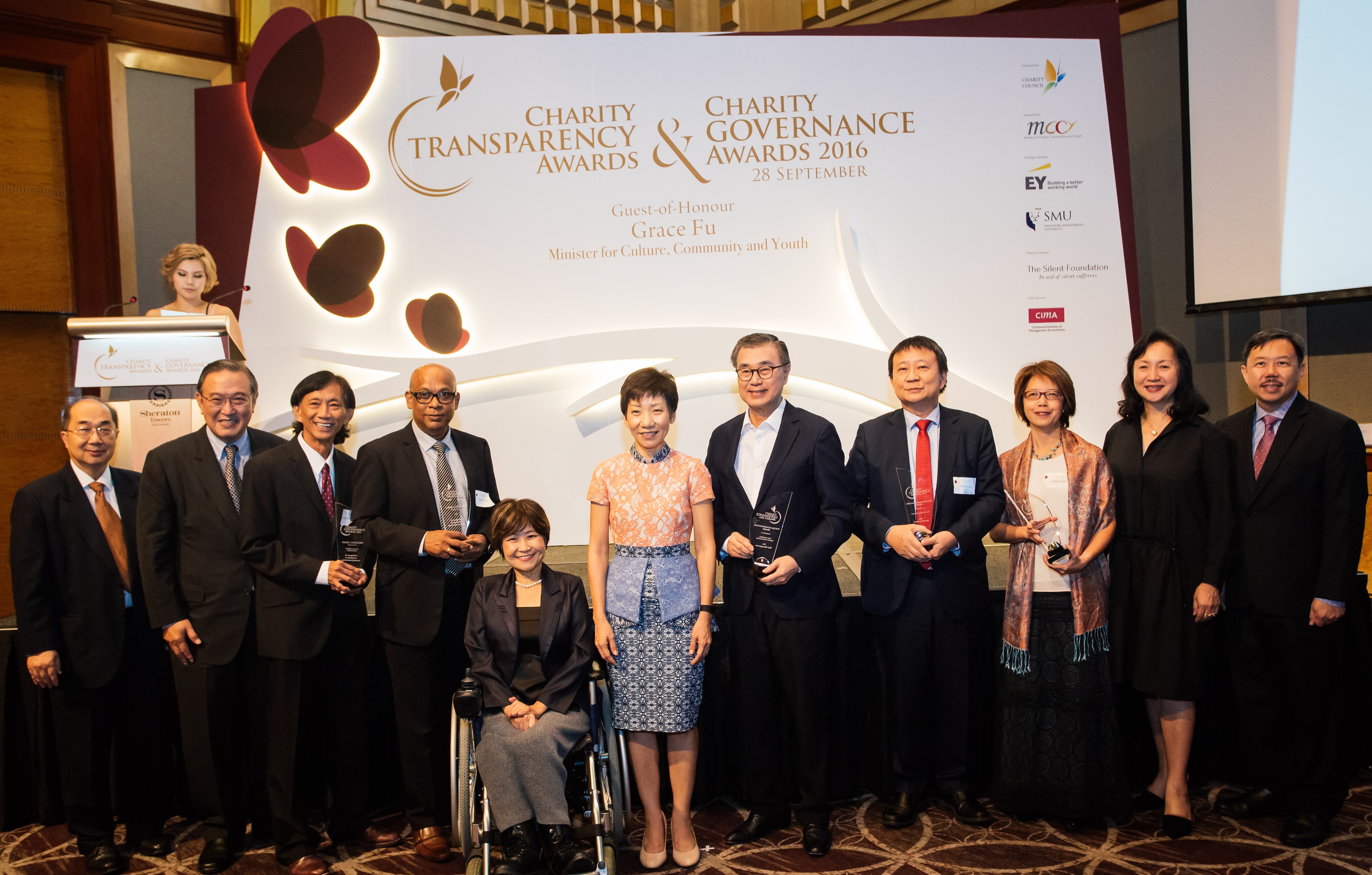
At the Awards Ceremony, the Nature Society (Singapore), Association of Women for Action and Research, and SPD were conferred top honours for achieving the highest standards of governance in the small, medium and large charity category respectively.
Special Commendation Award (SCA) was also given to two charities for their achievements in specific areas of governance. The Esplanade Co Ltd was awarded SCA for Clarity of Strategy and the National Kidney Foundation was presented with SCA for Risk Management.
Please click
here to download the Charity Transparency and Governance Awards programme booklet for full details of the 35 CTA winners, 3 CGA main category winners as well as the 2 Special Commendation Award recipients.
CGA 2016 Winners
The CGA 2016 winner of each main category received a plaque and a cash prize of $10,000 to further their charitable causes, sponsored by The Silent Foundation and Chartered Institute of Management Accountants (CIMA).
Please find the video of the 3 charities that were conferred this prestigious award and more details about each of the winners below.
Winner of Small Charities/IPCs Category- Nature Society (Singapore)
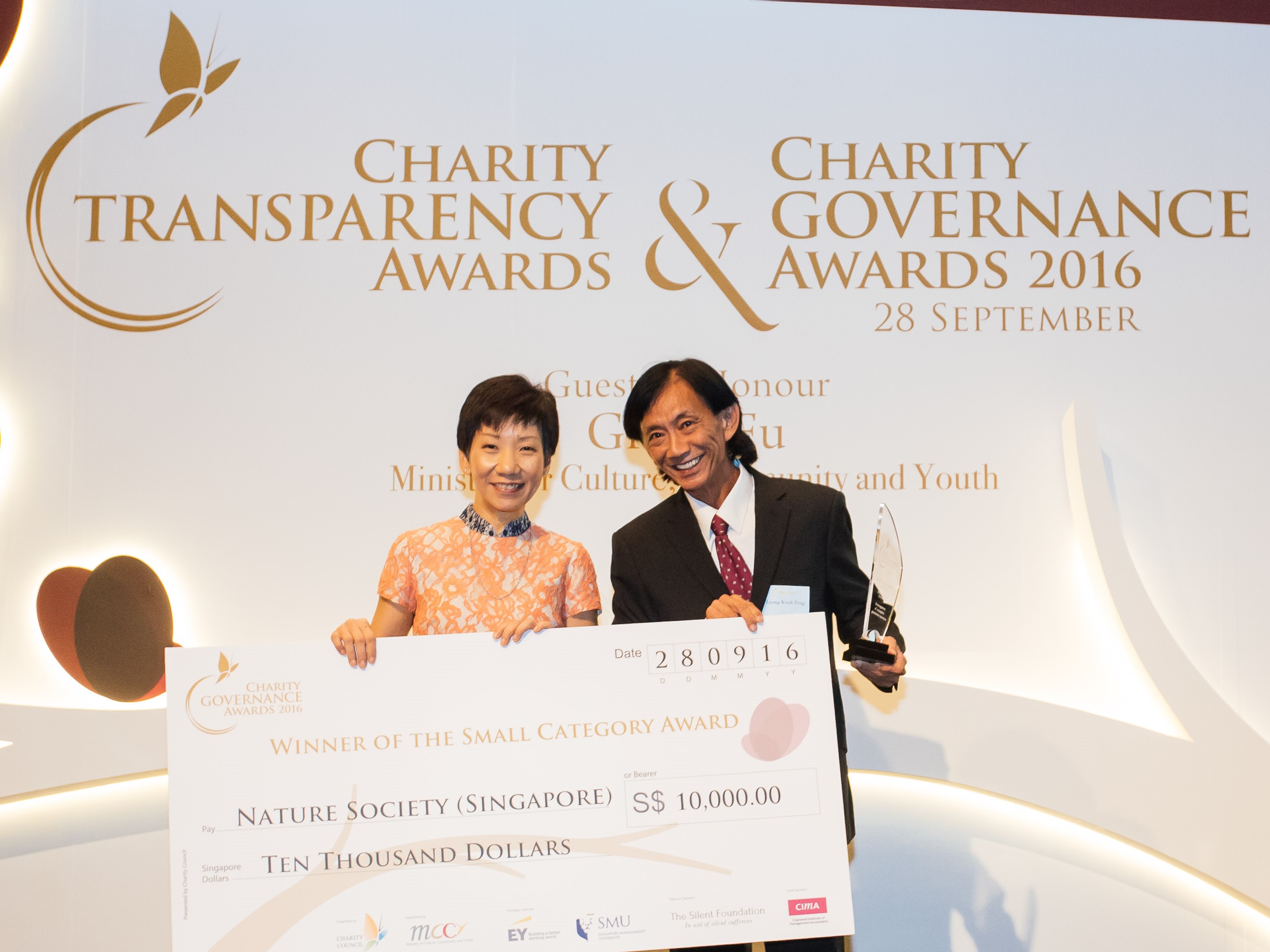
“We really started out as people who just love nature. If we, the Nature Society, a group that had no tradition of a particular lobby or activist structure, can come to the point where we have adopted a series of procedures that can be recognised, I think that should give encouragement to any civil society group.” Shawn Lum, President, Nature Society (Singapore)
Exemplary Governance Practices in Nature Society (Singapore) (NSS)
Starting out as a hobby group, made out of people who love nature, NSS unintentionally found itself in a position where it needed a voice and to be organised so that it can be heard, in a rational and systematic way, to protect what it loves. As accidental conservation advocates, the organisation had to learn and go through a whole set of governance issues, which it was not set up to deal with.
Articulated Plans and Procedures for Transparency and Accountability
Being answerable to its membership – which is 1,500 strong – and the people who believe enough in NSS to fund its work and programmes, NSS came to realise that it has an obligation, to its stakeholders, to have a clear and transparent process that outlines what NSS does and where their support goes to.
As a result, NSS adopted a clearly articulated strategic plan that made the Charity more transparent and accountable. The plan outlines the NSS’s short, medium and long-term ambitions. Instead of working on an ad-hoc basis like it used to, the Charity’s goals are now stated in writing and presented to its stakeholders. This enables the stakeholders to hold NSS accountable to those goals.
The strategic plan that was drawn up serves as a platform for future planning and a basis on which the organisation engages with its stakeholders. With an expressed vision, clarity of strategy and transparency, people know where the donated funds go to, what it is doing and what is being accomplished, which is in line with the NSS’s cause, mission and core values.
Benefits of Good Governance
Through a conscious decision to have a clear organisational structure and good governance practices, NSS has evolved from a humble group of nature lovers into an effective, constructive and inspiring conservation voice in Singapore and the region. This development strengthened the NSS’s credibility and turned past adversaries into advocates. It gained the trust of governing agencies to not only lobby for certain areas, but to even adopt and manage areas such as the Kranji Marshes.
Good governance has helped NSS convince people who believe in its message to support its cause in conserving biodiversity in Singapore. It enables NSS to encourage others to believe in the Charity and believe that by working together, the natural heritage of Singapore has a better future.
Winner of Medium Charities/IPCs Category - Association of WWinner of Medium Charities/IPCs Category - Association of Women for Action and Research
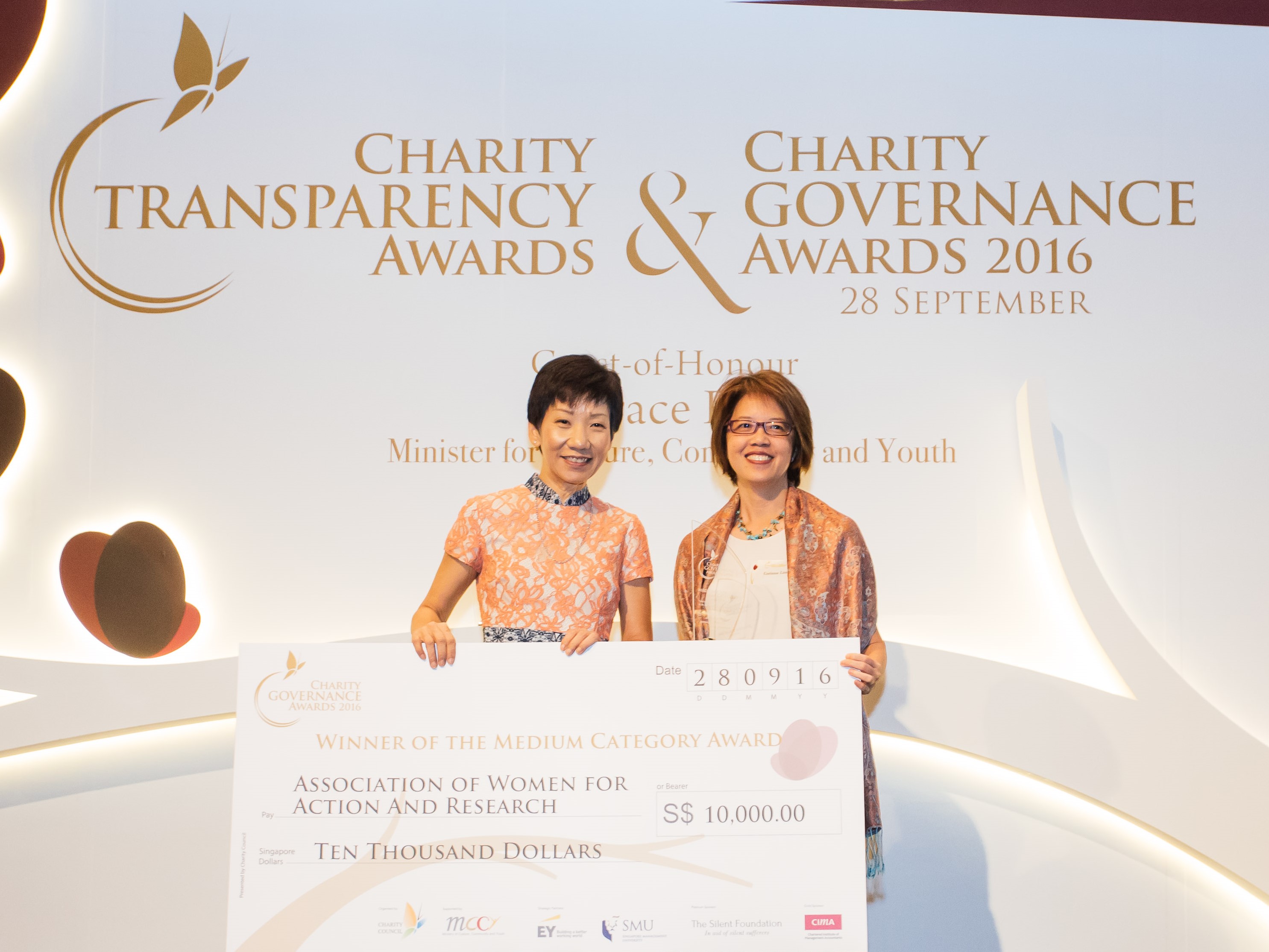
“Wherever you are, the CGA process serves as a stocktake of the stage of governance you are at and you could use the findings for next year’s planning. Focus on the areas that you can achieve and move on to the next one the following year.” Ms Corinna Lim, Executive Director, AWARE
Exemplary Governance Practices in AWARE
In 2010, AWARE transitioned from a volunteer led executive committee to a staff led organisation with a strong governance Board to strengthen the organisation and administration thus ensuring continuity and sustainability. The Charity took essential steps in key areas of governance to prevent it from going downhill.
Having a Clear Strategy
First and foremost, knowing where the organisation is going is important. For that to happen, AWARE needs a clear strategy that defines its direction for both long term and short term. In 2014, AWARE came up with a 5-year strategic plan and since then, the charity implemented annual plans that look at where the organisation is in relation to its long-term strategic plan.
This determines what AWARE needs to do in each year that follows. The planning is then filtered down to the staff level so that all KPIs are set according to the plan and that outlines the work for everyone in the organisation for the year.
Getting the Right People
AWARE is proud to have a Board that works well in propelling the Charity forward. A good Board is essential in helping AWARE solve issues from a high-level perspective, adopt a strategic view and ask challenging questions to steer the organisation through a demanding environment. To ensure that the organisation has a good Board, AWARE takes on Board members who know the organisation by making it mandatory for prospective Board members to be a member of AWARE for at least 2 years before they can run for election.
A few months before the election, the incumbent Board will meet all those who are interested to run for election – many of those would have been talent spotted from AWARE’s pool of 400 volunteers – to ensure that they have the interest and calibre to do governance work as well as the familiarity with all aspects of the organisation.
Subsequently, the nomination committee decides on those who are the most suited to run for election. The healthy competition – 13candidates ran for 9 seats in 2015 – makes the candidates take the seats seriously. They will think about how they can contribute and work to deliver their promises once they are elected. Once on the Board, the new Board members are eased in through a 1-hour long orientation session during each of the first few Board meetings. This drip-feeds the technical information on AWARE over a period of 3-4 months, which is more effective than inundating the new Board with the same information over a 1-day orientation programme.
AWARE places importance on getting the Board recruitment and induction right at the beginning as that makes the rest of the Board’s 2-year term relatively smooth. The Audit Committee and Human Resource (HR) Committee are also crucial parts of good governance, in AWARE. The Audit Committee is recruited from a pool of experts – who have past experience in auditing – and it advises the board on how to react to governance issues that arise and proactively perform a risk assessment to anticipate possible weaknesses. AWARE’s HR Committee, on the other hand, takes care of hiring the right people and resolves conflict of interest issues, which goes a long way in ensuring the well-being of the organisation.
Establishing a Feedback Loop
AWARE ensures transparency and accountability to its stakeholders – donors, members, volunteers, beneficiaries and policymakers - by having an active website, a monthly newsletter, a Facebook page which is updated with 2-3 posts a day and a good annual report on its website to provide as much information as is appropriate to the society it serves.
Besides communicating to the public what AWARE does, the Charity has a feedback loop to understand how people perceive the value that it brings to society. AWARE does impact surveys from time-to-time to find out what various stakeholders value and how it can do better to deeper understand how the organisation is performing. AWARE also conducts donor and volunteer surveys, electronically, every other year to find out what their experience have been, while working with AWARE. This helps AWARE uncover smaller operational issues that happen on the ground.
With a good feedback loop, AWARE is able to continuously identify weaknesses and take the necessary action to strengthen those areas.
Benefits of Good Governance
Although having good governance may not have a direct impact on the beneficiaries, it is a long-term investment that any organisation should make to reduce risk; to ensure long-term sustainability; and to maintain public confidence. The right strategy ensures that the Charity continues to be relevant and expand – if it is the right way of going forward – so that it evolves and adapts to the changing needs of its beneficiaries. Documented procedures enable proper training to be conducted and ensure knowledge retention and management. This results in a consistency of service, which will ultimately have an impact on beneficiaries.
Winner of Large Charities/IPCs Category: SPD
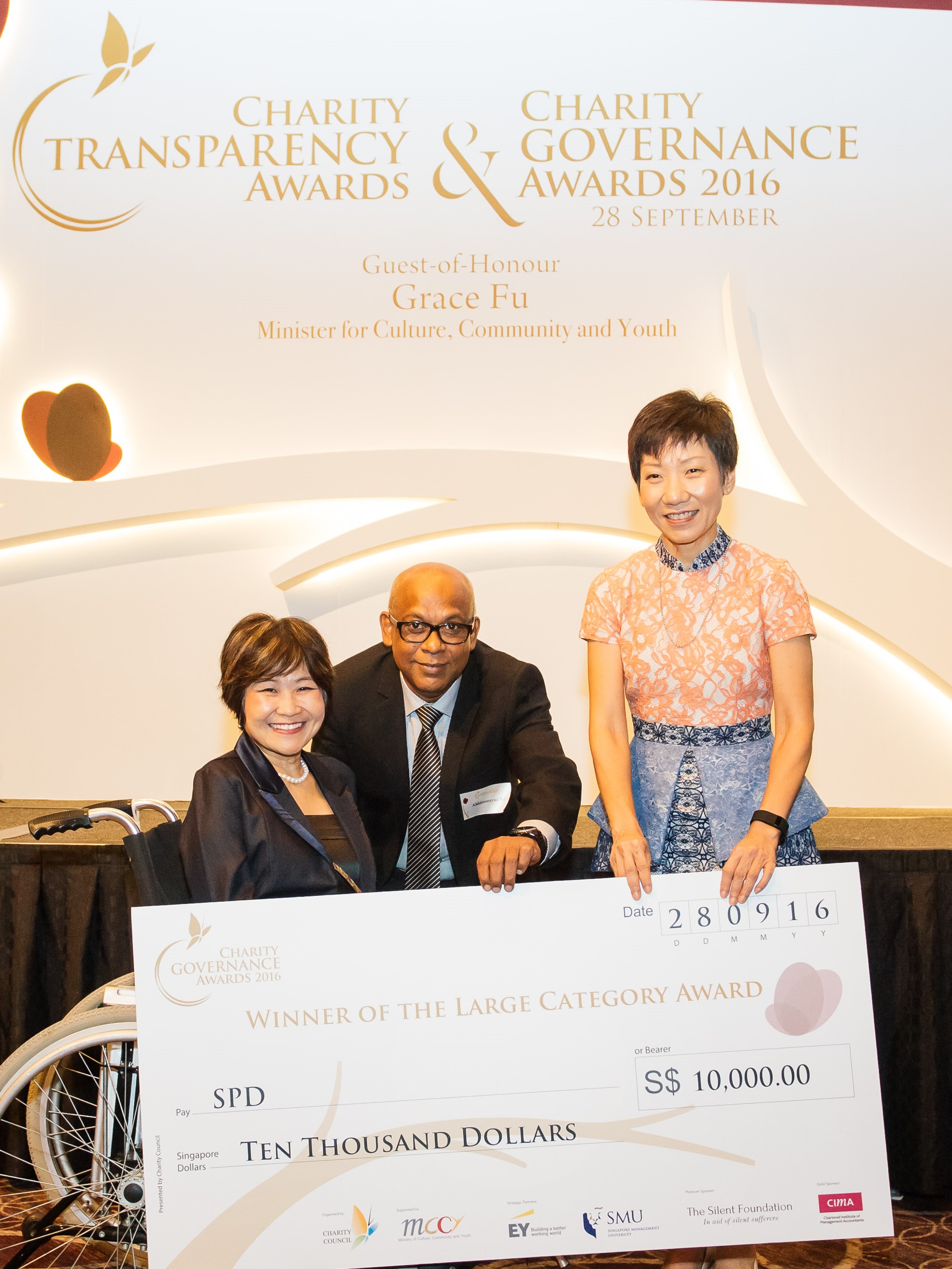
“Governance is not a process that we all have to put up with but it is a process that is integral to the good running of every organisation. It is integral to the welfare of our beneficiaries. It starts with a change in mindset which must begin at the Board level, at the Senior Management level and right down to every person who is serving in the organisation. Ms Chia Yong Yong, PBM, President, SPD"
Exemplary Governance Practices in SPD
To SPD, good governance is a journey and never an isolated milestone or process. SPD believes in good governance not because it simplifies or clarifies processes, but because good governance is ultimately about maintaining accountability to the people it serves that it can help them, and also to those who believe in SPD enough to fund and partner with the Charity. SPD has been continuously putting in place processes, fine-tuning them and trying to identify gaps in an open-minded effort to improve the organisation.
Organisation-wide Feedback and Buy-in
Good governance spans throughout the whole organisation. In SPD, this encompasses backend operations, staff capability development, service delivery, reporting and communications - both external and internal. Processes are set up with the help of feedback from the staff so that there is buy-in from an early stage. Feedback and input from the Board, which plays an advisory and strategic role, is also taken into consideration.
Together with the Board, a Management Team that believes in the importance of governance and foresight in the social service landscape and staff that adheres to the organisation’s values form a crucial partnership that has taken SPD to where it is today.
Succession Planning
SPD ensures continuity through proper succession planning for its Board. The Charity works with the Centre for Non-profit Leadership (CNPL) and leverages on its network to induct potential Board members who share the Charity’s beliefs and values and who possess the requisite experience and professional expertise that is needed in the organisation. Inductees are placed into subcommittees to give them a better understanding of what SPD is about and for SPD to know them better, much like a courtship. This helps the organisation to determine the right people to put on the Board.
Clear Guidelines and Communications
SPD sets in place clear policies on issues like conflict of interest as well as guidelines on the day-to-day matters such as the participation and delivery of its programmes, the training of professionals, and communication with beneficiaries to make them understand and cooperate towards the betterment of their health.
The guidelines also ensure clear communication with other important stakeholders and this facilitates the effective delivery of its services. For example, clear communication with caregivers, who carry a heavy burden, will make them aware of the processes and manage their expectations. This reduces a great deal of anxiety and allows them to focus on the issues at hand.
Benefits of Good Governance
Apart from helping SPD’s caregivers lighten their burden and ensuring that quality service is delivered to its clients, good governance assures stakeholders, such as sponsors and partners, that they have rightly placed their trust in an organisation that uses its resources responsibly. It encourages them to reach out to other organisations and frame certain expectations when they interact with charities - to know what can and cannot be done, and what should and should not be done. This creates a positive effect on the social service landscape that will ultimately benefit those who need help.
Special Commendation Awards
Special Commendation Awards are given out to charities for excellence in particular areas of governance. Each winner was presented with a plaque.
Special Commendation Award For Clarity in StrategySpecial Commendation Award For Clarity in Strategy - The Esplanade Co Ltd
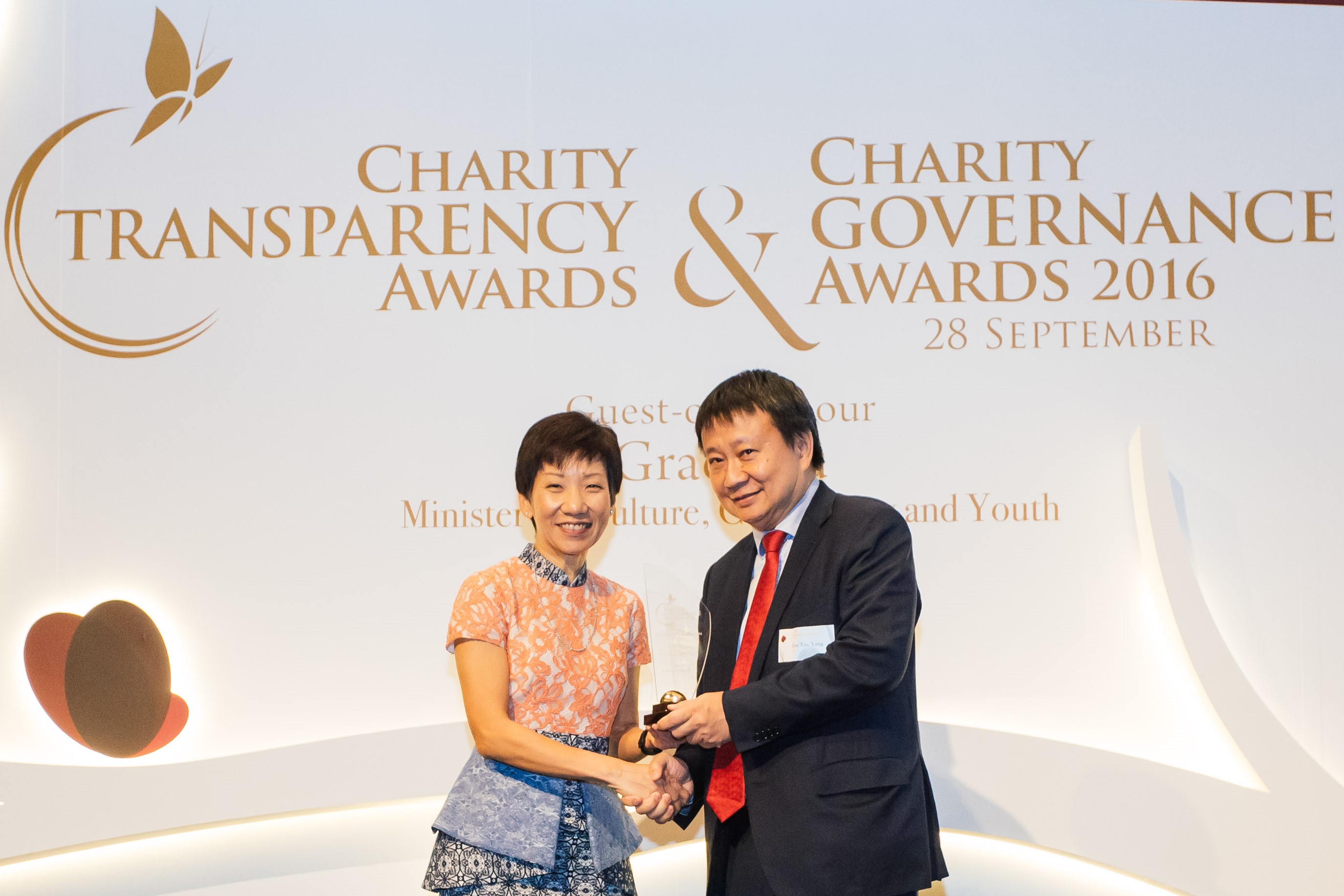
“The pace of social and technological changes around us demands that charities and public institutions cannot stand still if we want to continue to serve our communities well. At Esplanade, we have to develop new ways to engage the young in the digital space. And as society shifts, we also ask if we can do more to ensure that seniors, children or communities in more challenging circumstances have the chance to benefit from the arts in their lives. Mr Benson Puah, Chief Executive Officer,The Esplanade Co Ltd"
Exemplary Governance Practices in The Esplanade Co Ltd
From its pre-opening preparation stage, Esplanade had established long term goals for its community engagement, artistic and industry development strategies, as well as the structure to ensure organisational and financial sustainability. Esplanade sees these delivered through its strategies that are developed and implemented in cycles of three to five years. The need for such clarity of strategies and a clear strategic framework is essential to balance the needs for financial sustainability, relationship with partners and supporters, with the artistic, cultural and social goals embedded in the charity’s mission.
Strategy Formulation and Communication Process
The strategies are formulated by the Management with reviews undertaken during Esplanade’s annual Management Time-out. Guided by this, each department prepares its annual work-plans and budgets. The strategies, updates on key initiatives and progress are communicated to the staff during the monthly General Staff Meetings.
Review and tracking of strategy outcomes
The outcomes and progress of the charity’s strategy implementation are tracked by its Balanced Scorecard framework which is reported to its key stakeholders and Board quarterly. In the spirit of transparency, an overview of its strategies and Balanced Scorecard is published in its annual report.
Regular audience surveys are conducted, to ascertain more qualitative indicators and feedback on the effectiveness of the charity’s strategies. At the programme and initiative level, staff also analyse the effectiveness and impact of their efforts via post-event reports. All of which are further input to refine Esplanade’s strategies.
Benefits of Good Governance
The regular iteration of our strategy and the achieved outcome via the Balanced Scorecard framework and Annual Report ensures clear accountability to Esplanade’s external stakeholders, for the support they give towards our vision and mission. Internally, it served Esplanade well in ensuring that staff are disciplined, focused and motivated by Esplanade’s mission as a public institution.
Special Commendation Award for Risk Management - The National Kidney Foundation
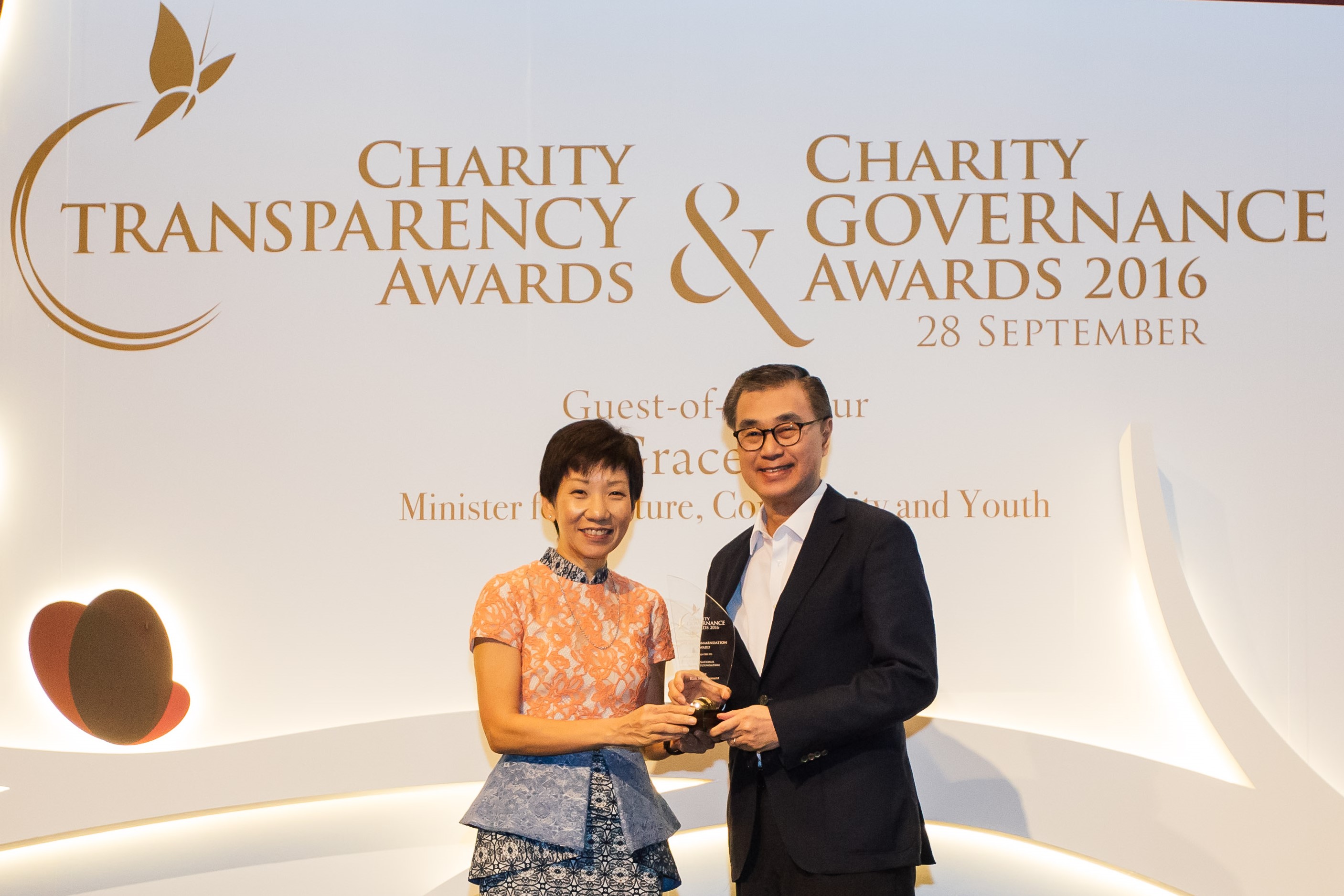
“The journey to good governance has been challenging but well worth the effort. It requires a thorough review and an openness to embrace necessary changes to the way we used to do things, including breaking long established habits. The greatest challenge is to move an organisation to a risk-aware, and eventually risk-mature, organisation. This is the right thing to do and we stay on course until we succeed. Mr Koh Poh Tiong, Chairman, NKF"
Exemplary Risk Management Practices in NKF
NKF has imbibed a culture of risk management being everyone’s responsibility and this is built into its processes. Starting with good governance, the charity established distinct roles of responsibility and accountability with clear measurable outcomes. This allows good risk managed processes to be put in place. Such processes include enhanced personal data protection processes across the organisation and reliable business continuity plans that allow NKF to mitigate crises.
Benefits of Good Governance
With a risk managed culture, the organisation can reliably achieve its objectives while steering through many uncertainties. Good risk management practices have helped the charity gain the confidence of both its staff and the public in its ability to fulfil its mission. With greater public confidence in NKF, as a result of good governance, the charity will be able to garner even more support to build more dialysis centres. More importantly, it will be able to further expand its efforts in awareness and prevention through new community outreach initiatives to benefit the public, and curb the onset of kidney diseases.
Special Acknowledgements
The Charity Council would also like to extend our sincere appreciation to our Strategic Partners – SMU and EY, as well as all our CTA and CGA judges for making this Award possible.

(CTA Judges (L-R): Mr Gerard Ee, Charity Council Chairman; Mr Jerry Lee, Managing Director, Ng, Lee & Associates – DFK; Minister Grace Fu; Dr Lan Luh Luh, Associate Professor, NUS Law and Business School; Dr Foo See Liang, Associate Professor, SMU School of Accountancy. Not in picture: Mr Irving Low, Partner, KPMG Advisory LLP; Mr Lee Fook Chiew, CEO, Institute of Singapore Chartered Accountants)
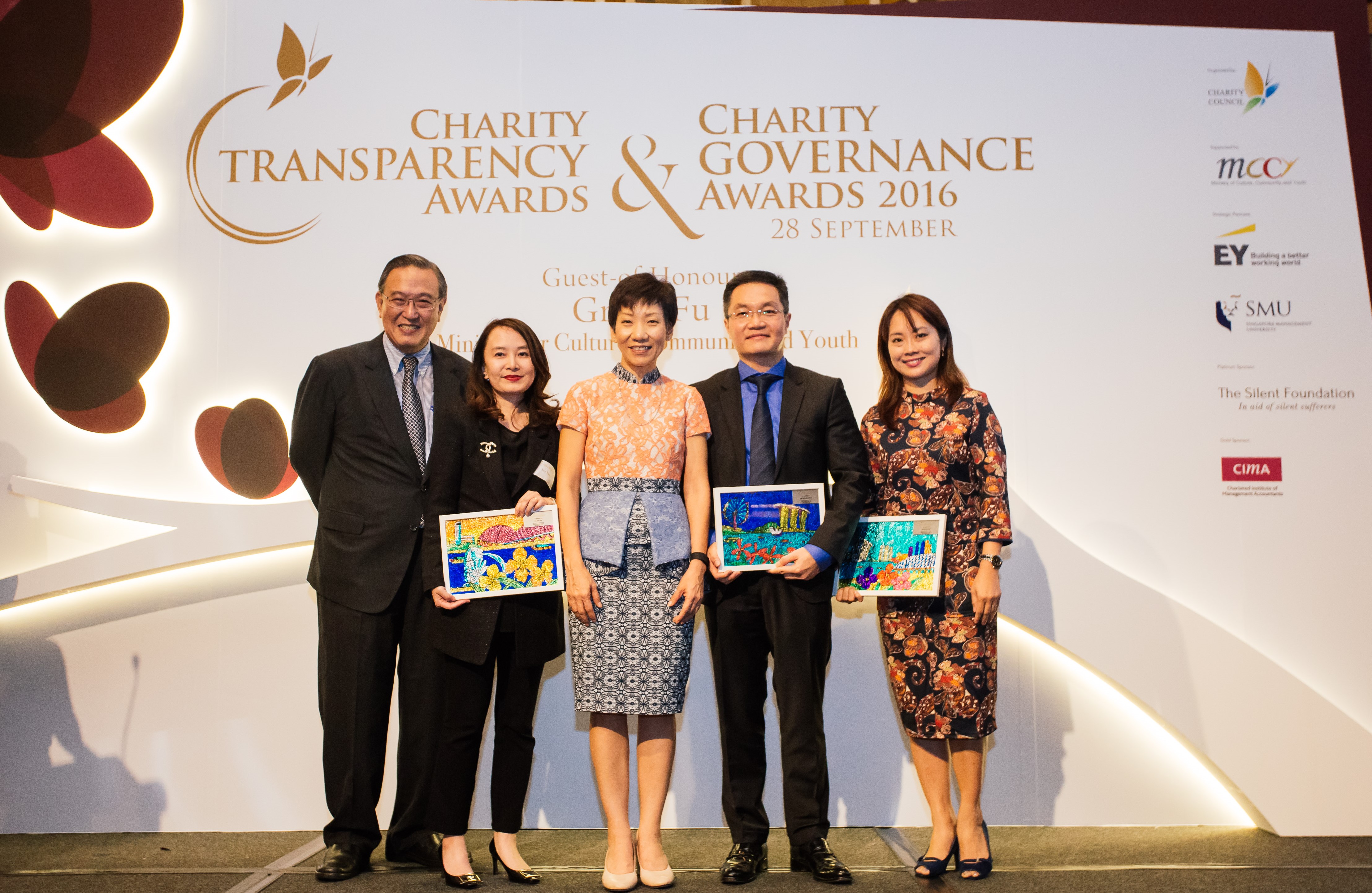
(CGA Judges (L-R): Mr Gerard Ee, Charity Council Chairman; Ms Joy Tan, Partner, WongPartnership LLP; Minister Grace Fu; Mr Neo Sing Hwee, Partner, Ernst & Young Advisory Pte Ltd; Ms Yap Su-Yin, CEO, Tan Chin Tuan Foundation. Not in picture: Mr Sim Guan Seng, Managing Director, Baker Tilly TFW; Mr Ajay Kanwal, Regional CEO, Standard Chartered Bank)
Excellence describes the optimum point of the quality spectrum. As we celebrate the achievements of our fellow charities, the Charity Council would like to encourage everyone to continue the good work and renew your commitment to governance excellence. Excellence is not a destination; it is a continuous journey that never ends. The Council hopes all charities can share and learn good practices from one another, and strive towards exemplary governance standards.
Congratulations to our winners! Thank you for your passion, drive and commitment to pursuing excellence!
